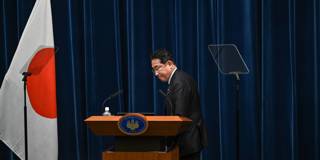While the media seemed surprised by Japanese Prime Minister Fumio Kishida’s decision not to run for re-election, it was hardly incomprehensible. Rather than risk losing the next election and potentially tarnishing an impressive record, Kishida stepped aside – and might become the kingmaker within his Liberal Democratic Party.
TOKYO – On August 14, Japanese Prime Minister Fumio Kishida announced that he would step down as leader of the ruling Liberal Democratic Party in September. Soon after, the LDP will select Kishida’s replacement – who will serve as prime minister, given the LDP-led coalition’s control of the Diet (the lower house of parliament). The new government is then likely to call a snap election, in the hopes that the “honeymoon effect” will help it increase its majority. What the LDP must figure out now is which of its members has the standing with the public and within the party to lead the way to victory.

TOKYO – On August 14, Japanese Prime Minister Fumio Kishida announced that he would step down as leader of the ruling Liberal Democratic Party in September. Soon after, the LDP will select Kishida’s replacement – who will serve as prime minister, given the LDP-led coalition’s control of the Diet (the lower house of parliament). The new government is then likely to call a snap election, in the hopes that the “honeymoon effect” will help it increase its majority. What the LDP must figure out now is which of its members has the standing with the public and within the party to lead the way to victory.